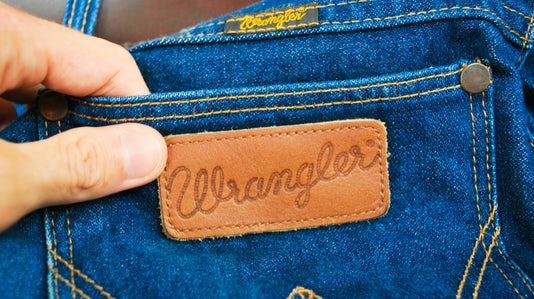
Wrangler debuted a refreshed manifesto for conveying its enduring commitment to sustainability — and for the heritage denim brand, that takes form in a new platform, WeCare Wrangler, that serves to “leave an impression, not an impact” on people and the planet.
Its WeCare Wrangler platform outlines the brand’s sustainability objectives and strategic roadmap to future targets that lengthen its reach in greening in the fashion industry.

Building off of the brand’s longstanding commitment to operate and innovate sustainably, its platform is centered on transparency and designed to inform consumers of Wrangler’s “measurable goals designed to bring consumers the apparel they know and love while reducing the brand’s environmental impacts.”
Tom Waldron, executive vice president, global brand president of Wrangler, said, “It matters to Wrangler what’s in our clothing. Our process for creating apparel that consumers are passionate about starts with respect for both the planet and the people who call it home. The WeCare Wrangler sustainability platform will act as our roadmap as we help lead the industry toward meaningful change that creates more positive environmental and social impacts.”
Its launch is in tandem with a new Retro Green jean assortment made with a variety of natural fibers, recycled hardware and eco-friendly materials.
The WeCare Wrangler platform is guided by a trifecta of three key areas: planet, product and people. First and foremost, its planet pillar acknowledges that Wrangler denim starts as cotton, and the brand is “committed to protecting the land from which it grows,” which begins from protecting the soil itself to saving water and reducing waste and energy use.

Product, its second key area, is devoted to innovation, as “the planet’s resources are limited and [the brand] is constantly rethinking how its products are made and what they’re made of — finding more ways to useless.”
And lastly, its People pillar refers to its pledge to “do right by all people with the products it makes.” Wrangler explained that this means treating workers throughout its global supply chain “fairly and with respect,” as well as upholding the brand’s commitment “to find more ways to have a less environmental impact on the planet.”
The brand emphasized that part of its WeCare Wrangler ambition is to continue working toward its lofty goals for a more sustainable future, which includes 100 percent preferred chemistry throughout its supply chain by 2023; 100 percent renewable energy powering all owned and operated facilities by 2025; 100 percent sustainable cotton by 2025, and 50 percent reduction in water usage by 2030, all according to Wrangler.
Wrangler also continues to seek strategic alliances that align with its sustainability objectives, such as signing onto the Ellen MacArthur Foundation’s Jeans Redesign guidelines last year, in addition to joining its Make Fashion Circular initiative, “which drives collaboration between apparel industry leaders to ensure clothes are made from safe and renewable materials, new business models increase their use, and old clothes are turned into new,” the company said.
Jeff Frye, vice president of product development and direct procurement at Kontor Brands, said, “We’re continuously looking for opportunities to work with our partners and suppliers to minimize the impact on the planet. When we all work together, we can create apparel that not only looks good but conserves the land it’s created from.”


